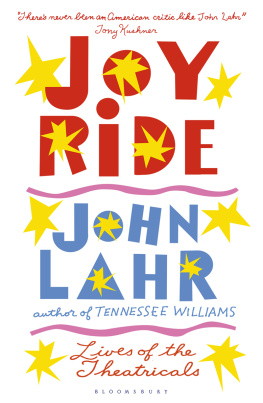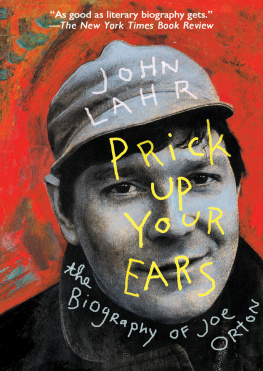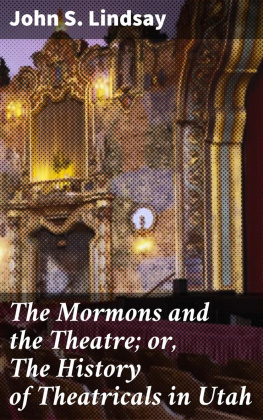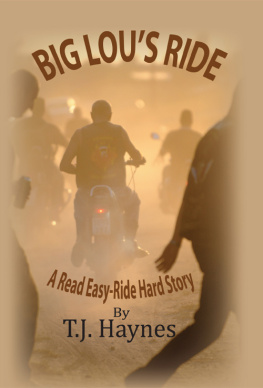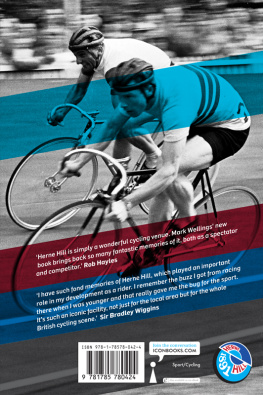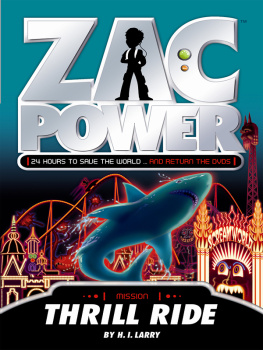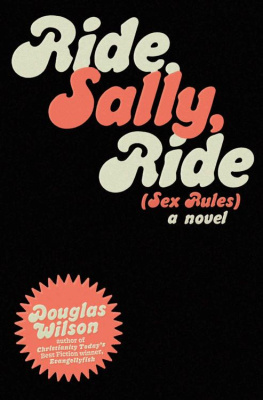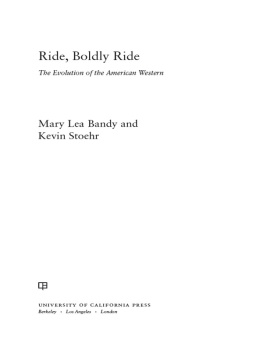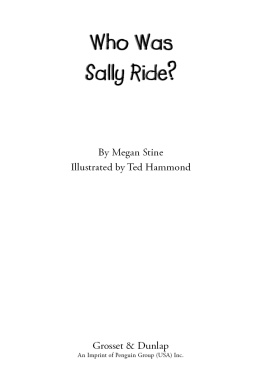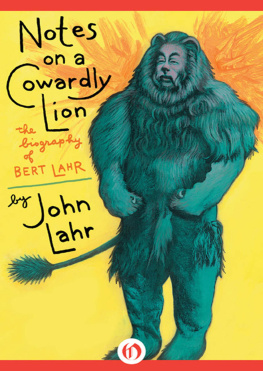Lahr - Joy ride lives of the theatricals
Here you can read online Lahr - Joy ride lives of the theatricals full text of the book (entire story) in english for free. Download pdf and epub, get meaning, cover and reviews about this ebook. year: 2016, publisher: Bloomsbury Academic, genre: Detective and thriller. Description of the work, (preface) as well as reviews are available. Best literature library LitArk.com created for fans of good reading and offers a wide selection of genres:
Romance novel
Science fiction
Adventure
Detective
Science
History
Home and family
Prose
Art
Politics
Computer
Non-fiction
Religion
Business
Children
Humor
Choose a favorite category and find really read worthwhile books. Enjoy immersion in the world of imagination, feel the emotions of the characters or learn something new for yourself, make an fascinating discovery.
- Book:Joy ride lives of the theatricals
- Author:
- Publisher:Bloomsbury Academic
- Genre:
- Year:2016
- Rating:5 / 5
- Favourites:Add to favourites
- Your mark:
- 100
- 1
- 2
- 3
- 4
- 5
Joy ride lives of the theatricals: summary, description and annotation
We offer to read an annotation, description, summary or preface (depends on what the author of the book "Joy ride lives of the theatricals" wrote himself). If you haven't found the necessary information about the book — write in the comments, we will try to find it.
Lahr: author's other books
Who wrote Joy ride lives of the theatricals? Find out the surname, the name of the author of the book and a list of all author's works by series.
Joy ride lives of the theatricals — read online for free the complete book (whole text) full work
Below is the text of the book, divided by pages. System saving the place of the last page read, allows you to conveniently read the book "Joy ride lives of the theatricals" online for free, without having to search again every time where you left off. Put a bookmark, and you can go to the page where you finished reading at any time.
Font size:
Interval:
Bookmark:

A NOTE ON THE AUTHOR
JOHN LAHR was the senior drama critic for the New Yorker for twenty years (19922013). He is a critic, novelist and biographer and is the author of seventeen books, including Notes on a Cowardly Lion , the biography of Bert Lahr and, most recently, Tennessee Williams: Mad Pilgrimage of the Flesh , which won the National Book Critics Circle Award for best biography, the American Academy of Arts and Letters award and the Sheridan Morley Prize. He lives in North London.
To
GEORGEANNA MOTTS
Guardian Angel

ALSO BY JOHN LAHR
BIOGRAPHY
Tennessee Williams: Mad Pilgrimage of the Flesh
Honky Tonk Parade: New Yorker Profiles of Show People
The Diaries of Kenneth Tynan (editor)
Show and Tell: New Yorker Profiles
Sinatra: The Artist and the Man
Dame Edna Everage and the Rise of Western Civilization: Backstage with Barry Humphries
The Orton Diaries (editor)
Coward the Playwright
Prick Up Your Ears: The Biography of Joe Orton
Notes on a Cowardly Lion: The Biography of Bert Lahr
CRITICISM
Light Fantastic: Adventures in Theatre
Life-Show: How to See Theater in Life and Life in Theater (with Jonathan Pryce)
Astonish Me: Adventures in Contemporary Theater
Acting Out America: Essays on Modern Theatre
Up Against the Fourth Wall: Essays on Modern Theater
A Casebook on Harold Pinters The Homecoming (edited with Anthea Lahr)
NOVELS
Hot to Trot
The Autograph Hound
PLAYS
Elaine Stritch at Liberty (with Elaine Stritch)
The Manchurian Candidate (adaptation)
The Bluebird of Unhappiness: A Woody Allen Revue (adaptation)
Diary of a Somebody (adaptation)
Accidental Death of an Anarchist (adaptation)
JOY RIDE
LIVES OF THE THEATRICALS

JOHN LAHR

CONTENTS
We must risk delight. We can do without pleasure, but not delight. Not enjoyment. We must have the stubbornness to accept our gladness in the ruthless furnace of this world...
Jack Gilbert A Brief for the Defense Refusing Heaven
In my half century of theatergoing, Ive seen grown-ups stand on their seats to cheer, keel over into the aisle after a punch line, throw coats onto a horseshoe stage for the parading star to step on, stuff handkerchiefs in their mouths to keep from laughing, and even briefly lose consciousness and collapse between seats. That last ecstatic guy was me, blindsided by one of Dame Edna Everages illiberal salvos. Part of the theaters big magic is its ability to exhilarate; it has the power to put us beside ourselves, to banish gravity, to call out of us our most buried feelings, to make the moment unforgettable, to kill Time. Thats its joy ride.
Nowadays, theater criticism is on the decline. The medias obsession with lifestyles and celebrity has hijacked the discussion of the dramatic craft and process. Thumbs up or down are hardly good compasses by which the public can get its bearings on a writer and the work. As a result, the theatricals and the cultural history to which they contribute are largely left out of the public conversation. (Who is Marlon Brando? a twenty-something college-educated fact-checker at The New Yorker asked me a while ago.) If we see a play today, its usually in the context of no context. This depletes the audiences pleasure, as well as its sensibility. The more we know about the artists, the more we can appreciate their art. If we need better playsand we dowe also need better audiences. As Tallulah Bankhead once told an avid would-be actress, If you really want to help the American theater, dont be an actress, dahlin g, be an audience.
Since my mid-twenties, I have spent a good part of my professional life as an audience member. I grew up in the theater; Ive written for the theater; Ive helped to manage theaters. I have an abiding affection for the derring-do of actors, who are, in my eyes, athletes of the spirit. Ever since my sister, Jane, and I hung out between shows in my fathers dusty Broadway dressing room, playing among the costumes and props in the murk of backstage, the theater has been associated in my mind with fun, mystery, and adventure. Its where I go to think, to travel to places and times Ive never imagined, or to inhabit psychological situations that I would otherwise run a mile to avoid. Theater is where I can ponder the past and imagine the future. If Im honest, its also where I preserve the memory of my parents and their show-biz roots.
Theater is an artisanal industry in a technological age. Everything about it goes against the grain of our distracted, fast-moving cultural moment. A play requires the audience to work, to contend with eloquence and with ambiguity, to think. In a film, the audience sees what the director wants it to see; with a live production, the audience must take more responsibility for meaning. The fact that theater is a minority art form doesnt minimize its cultural importance. Theater is still the only popular entertainment in which you can hear a writers individual voice in stories undiluted by corporate agreement; in which language, in all its vulgar and vivacious permutations, is continually brought up to date; in which you can feel the carnal wallop of actors as they turn themselves inside out in the greatest show on earth, which is the show of human emotion.
In a movie or on television, performances are repeatable and unvarying; they dont require an audience. By contrast, in the theater, the spectators attention can make a significant difference to the quality of the event. The play was good but the audience was a dismal failure, George Bernard Shaw kidded on the square. The audiences job is to be open and alert to the world onstage; the actors job is to be open and alert to the world of the play. In a real sense, the audience is a partner in the play-making. Every performance is different, and so is every audience. Each night of a play is a new dance to the same tune. This dynamic exchange of energy is theaters particular piquancy. The synergy is humanizing; the paying customer enters as an individual but becomes part of a communal event, a sort of entangled collective, in which both sides of the theatrical equation learn from the others response. Your audience gives you everything you need, the legendary comedienne Fanny Brice once observed. Theres no director who can direct you like an audience.
In a time of terrorsuch as our timethe theaters promotion of ideas and feelings takes on a significant extra social valence. The terrorists ambition is not just to kill people but to kill thought; to divide the society against itself and, in doing so, force it to implode from within. As the general mood of retreat and the many political false steps of current Western democracies indicate, the strategy of terrorism is working better than we like to admit. Terrorism makes a spectacle of absurdity, in which pain unmakes the world. Theater, which attempts to understand our pain, makes a spectacle of meaning and coherence. Now, more than ever, theater is not only a demonstration of courage but an engineer of it.
Joy Ride: Lives of the Theatricals is my rearguard action to address the problem of the context of no context. The aim here is to bring the theatergoer up close and personal with the artists and their processes, with the plays and the playwrights, with what they seek to express, and how they express it. One section of the book deals exclusively with specific theatrical productions; in these cases, the critical task is to bring some sense of theater history to an appreciation of the event under consideration. In an ideal world, this volume would also include profiles of actors and of the makers of American musical theater, but the size of such a book was judged prohibitive for the pocketbooks of both the aficionados and the publishers. Tennessee Williams, Oscar Wilde, Noel Coward, and Barry Humphries (Dame Edna Everage)some of the supremos of the modern stageare conspicuous by their (almost complete) absence. Because Ive written extensively about them in other books, the decision has been to cede their spots to other accomplished playwrights, directors, and productions that have also corrupted me with pleasure. Taken together, what remains comprises many of the high points of my stint at The New Yorker .
Font size:
Interval:
Bookmark:
Similar books «Joy ride lives of the theatricals»
Look at similar books to Joy ride lives of the theatricals. We have selected literature similar in name and meaning in the hope of providing readers with more options to find new, interesting, not yet read works.
Discussion, reviews of the book Joy ride lives of the theatricals and just readers' own opinions. Leave your comments, write what you think about the work, its meaning or the main characters. Specify what exactly you liked and what you didn't like, and why you think so.

